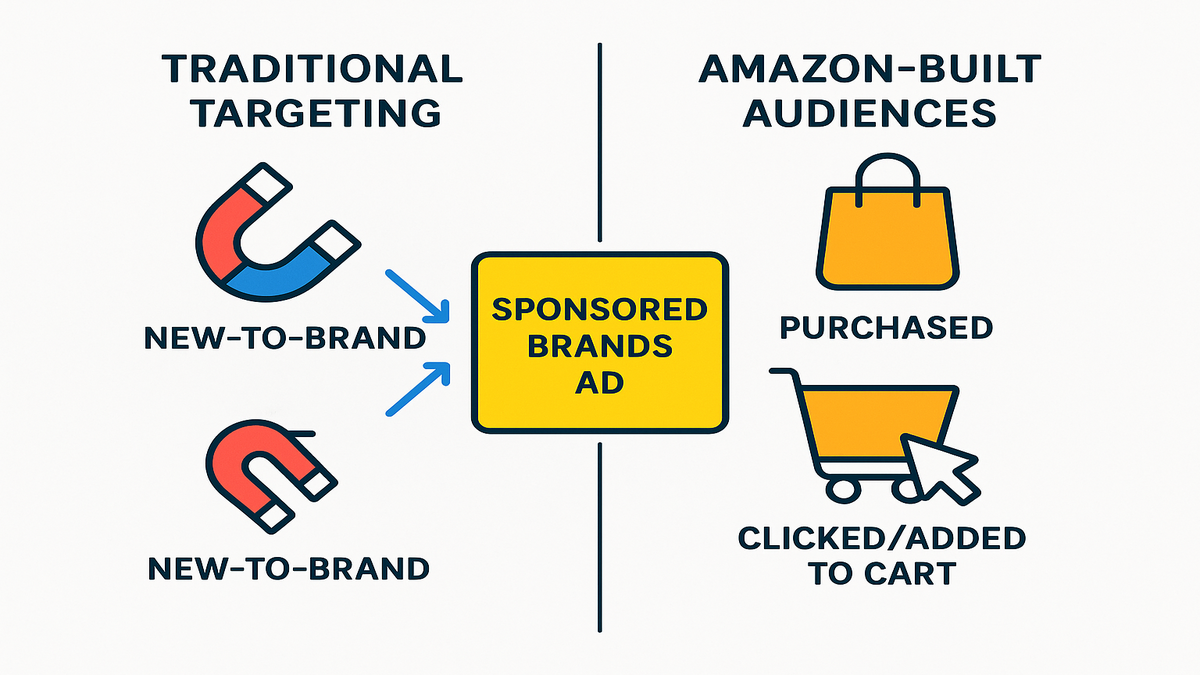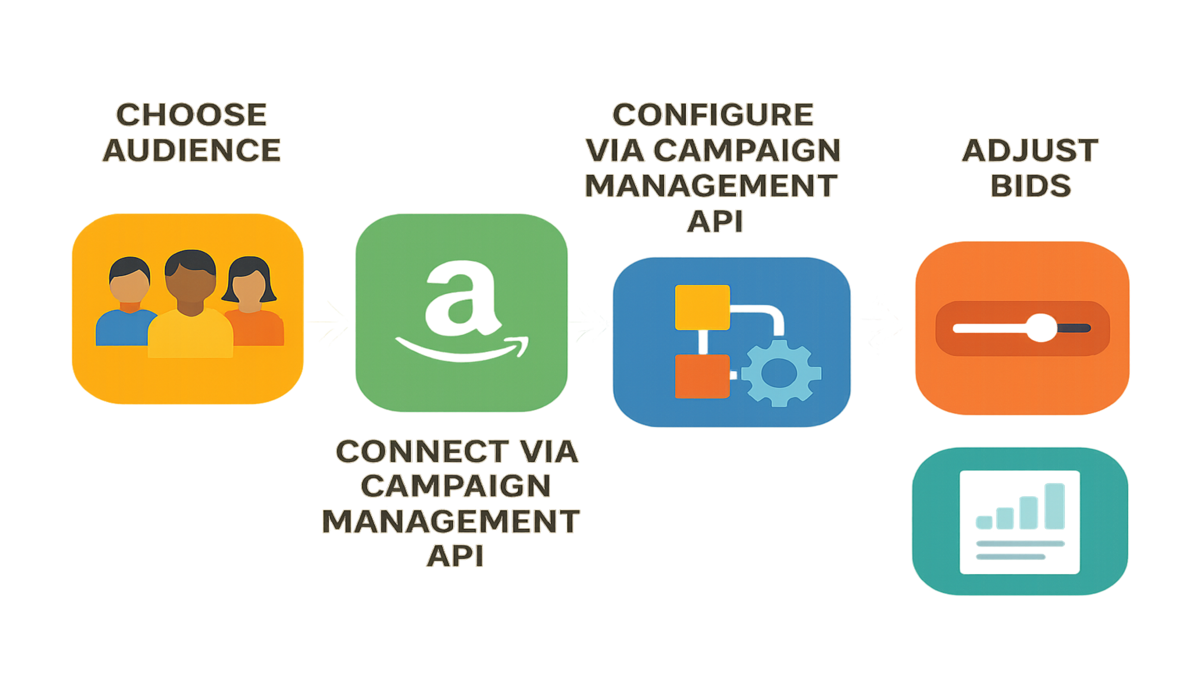
How Amazon-Built Audiences Are Supercharging Sponsored Brands
You probably thought you had Sponsored Brands ads under control. But Amazon just tossed a big curveball into the mix. If you’re still using old strategies, get ready—your rivals might blow right past you.
So, what’s up? Amazon dropped two totally new, first-party shopper audiences for Sponsored Brands ads. Think of it like swapping out your old flashlight for a sharp laser pointer. No more shining light in every direction—now you can lock in exactly who needs to see your ads. Instead of running after random shoppers, re-engage people who have actually shown up for your brand. They clicked, added to cart, or even bought from you before.
Let’s be honest—everyone’s fighting for a spot on the digital shelf. Shoppers don’t pay attention for long. Why waste your ad money on folks who don’t care? This new update lets you target the exact people who need just a little nudge to buy again. Or maybe finally finish checking out. It’s not screaming into a crowd anymore, it’s chatting with someone who already remembers your name.
Ever wanted to message shoppers, “Hey, remember that hoodie you almost grabbed?” Well, now you can do just that on Amazon. This isn’t a tiny tech update. It’s huge for anyone wanting to get more from their ad budget. Let’s dig into what’s new, why you should care, and how to use it without needing to be a tech wizard.
TL;DR:
- Amazon launched two new Sponsored Brands audiences: "Bought" and "Clicked/Added to Cart"
- Mix these with "New-to-brand" for more re-engagement
- Now, set separate bids for these audience groups
- Get deep Audience Reports via the SB API
- Tools you’ll need: Discovery API & Sponsored Brands Campaign Management API

Amazon-Built Audiences Explained
Old School vs. New School
For years, Sponsored Brands ads were like wearing an oversized t-shirt. Worked okay, but nothing special. You could target ‘New-to-brand’ shoppers—folks who never bought from you. Good for finding new fans, sure. But you missed a lot of chances in between.
Enter these two new first-party audience segments from Amazon:
- Purchased brand’s product: Shoppers who have already bought from you. They know you. Maybe they’re open to buying again or trying something bigger next.
- Clicked or Added brand’s product to cart: These are the almost-there people. They clicked, maybe tossed your product in the cart, but bailed. Hit them again with the right ad, and you might just seal the deal.
Here’s the thing—this isn’t based on weird third-party data or someone creeping on their browser history. It’s based on what shoppers actually did, straight from Amazon’s own books. As Alex Chen, Amazon Ads strategist, says, "It’s like supercharged retargeting with Amazon’s intent data. There’s no guessing."
How Audiences Work
Ever wished you could nudge those shoppers who just stopped short of buying? Now’s your time. Here’s how you play it:
- Purchased Brand’s Product: Use this group to show off your new products, start a subscription pitch, or upsell add-ons. Loyal fans start with knowing who already bought something.
- Clicked/Added to Cart: These are your second-chance people. A coupon, review, or quick reminder might just turn daydreamers into buyers.
So, instead of sending your Sponsored Brands ads out to everyone, you’re zeroing in on shoppers who acted interested. You don’t waste cash on looky-loos. Your money goes where it counts.
Why This Matters
Domino Effect on Performance
Remember the “rule of seven” in marketing? You need around seven touchpoints before someone buys. But if you target people who already engaged once or twice, things speed up. You’re not starting from zero with every ad.
Amazon’s own numbers prove it. In a 2023 benchmark, brands that stacked these Sponsored Brands audiences saw returns up to 18% better than those who didn’t target this closely (source). When you need every buck to count, that number is no joke.
Sara Long, Ecommerce Director at Onyx Brands, puts it simply: “Amazon’s new sponsored audiences let us talk to real buyers again. That’s a big edge.”
Beyond Simple Retargeting
Let’s be real—some targeting is just better. The new Amazon-built audiences use Amazon’s own goldmine of data. No guessing off third-party trackers or months-old browsing cookies.
Why does that matter? Third-party data is fading away (bye, cookies). Amazon’s wall of shopping behavior keeps you steps ahead. Real actions, not old rumors.
API Deep Dive
Finding and Using Audiences
Alright, here’s where the rubber meets the road. To grab these audiences, you’ve got to use Amazon’s APIs. Sounds geeky, but it’s huge for results. Here’s the nutshell:
- Discovery API (ListTargetableEntities):
- This is how you get a list of Amazon audience segments. Set
adProduct=SPONSORED_BRANDS,targetTypeFilter=AUDIENCE, and watch yourpathsFilter. You’ll get anaudienceIdthat lets you pick your target. - Sponsored Brands Campaign Management API:
- Take that
audienceIdand use it withAudienceSegmentType=BEHAVIOR_DYNAMICto steer your Sponsored Brands campaigns at just the right audience.
If tinkering with APIs isn’t your thing, check out tools like AMC Cloud. It’s built to take the hard work out of audience setup, measurement, and reporting. You get the fancy features, minus the heavy coding.
Example in Action
Say you run ads for a kitchenware brand. You spot tons of shoppers who click your flagship skillet but don’t check out. Target the Clicked/Added to Cart crowd and hit them with a promo for a skillet discount or bundle. Test different offers or ads—watch conversions climb.
Do this for your whole product lineup, and you’ll see just how big these new Amazon audiences can get for you.
Bid Adjustments

Precision Budgeting
Old way to budget? Throw money everywhere and hope for the best. New way? Line up each audience like a target and adjust your spend.
Now, you control bid tweaks down to each audience group. If you see one group buying more, boost their budget. Others? Dial it back. It’s just like tuning a race car—every tweak can help you win.
Example: Maybe users who added your item to their cart in the last two weeks are twice as likely to buy as brand-new visitors. Hike their bids by 25%. Get more eyeballs from people ready to buy. Less-keen groups? Don’t overspend.
Brand Success Stories
Brands who jumped on this early are already seeing results. Take a skincare brand: they tried a +30% bid for "Purchased" audiences, and repeat sales jumped 24% in just a month. That’s not bragging—that’s real growth.
Raj Patel, Amazon analytics consultant, says: “With these bid tweaks, we caught sales that used to slip by. Simple stuff, but big impact.”
Measuring Lift
Deeper Insights via Reports
Targeting works only if you can measure it. Enter the Sponsored Brands API Audience Report. It shows spend, conversions, sales, and return on ad spend just for each audience.
Slice your data any way: by audience, time frame, product, or campaign. This is stuff you can’t always see in the usual Amazon dashboard—finally, real accountability for every cent.
Data Points to Track
Smart marketers use these data points:
- ROAS and CPC by audience: See which groups bring the most for your dollar.
- Conversions by audience: Compare “Clicked,” “Purchased,” and “New-to-Brand.” Put more effort where it counts.
- Bid adjustment effect: Want to know if a 15% bid boost helped? The report tells you.
- Incremental sales: Are you just repeating past sales, or reaching new shoppers?
Blend this with Amazon Marketing Cloud data, and you’ll see from first click to die-hard fans.
Need even deeper numbers? Requery gives power reporting with built-in workflow tools just for Amazon brands.
Cheat Sheet
Bring this checklist next time you update campaigns:
- Tap shoppers who already care (“Bought,” “Clicked/Added to Cart”)
- Change bids for each group
- Use the right APIs to plug in easily
- Dig into every audience to find what’s working
Six Upgrades to Watch
If you’re a VP, growth lead, or run an agency, these are your fast tracks:
- Target smarter: Go past age and gender. Use real buyer or click history.
- Bid adjust anytime: Up or down, even while a campaign is live.
- Audience Reports: See tiny details to make smarter moves.
- Better return, less waste: Spend more on real, proven winners.
- Granular, pro-grade reports: New dashboards, perfect for agencies and brands.
- Easy APIs: Plug into existing tools, use for advanced work.
FAQ
Q1: What are the two new Sponsored Brands audiences?
A: “Purchased brand’s product” (people who bought) and “Clicked or Added brand’s product to cart” (engaged, but didn’t buy yet). They go with the old “New-to-brand” group.
Q2: How do I use these in campaigns?
A: Use Discovery API to find the correct audienceId, then set up or update your campaign using Campaign Management API. Remember to set AudienceSegmentType to BEHAVIOR_DYNAMIC.
Q3: Can I adjust bids for these new groups?
A: Yep! Change bids for each audience, both with new and old campaigns.
Q4: Where do I see how it’s working?
A: Use the Audience Report from the SB API Reporting tool. See spend, conversions, and ROAS for every segment.
Q5: How’s this different from Sponsored Products audience targeting?
A: Sponsored Brands gives deeper groups and uses solid first-party actions. Smarter retargeting than Sponsored Products’ broad intent buckets.
Q6: Are there limits here?
A: At this time, Amazon-built audiences are only available with AudienceSegmentType=BEHAVIOR_DYNAMIC, set in the Campaign Management API.
Six Steps to Launch
- Pick your goal: Go for Purchasers, Clicked/Added to Cart, or New-to-brand shoppers.
- Get your audienceId: Use Discovery API ListTargetableEntities and set the right filters.
- Choose the right segment: Pick the audienceId you want.
- Set up or update the campaign: Use Campaign Management API and plug in your audienceId.
- Adjust bids: Push more spend for high-intent groups, based on your own data.
- Watch and tweak: Use real-time Audience Reports. Adjust bids or ads for constant growth.
Targeting Amazon’s own audiences isn’t some bonus now—it’s the main lane. The brands who act fast get the best edge. The spray-and-pray days are ending. Use Sponsored Brands’ full audience tools to reach the right shoppers, every time, and let your rivals keep wasting ad dollars.
Want more? Read the full Sponsored Brand API documentation, check out Amazon sponsored brand ads strategies, or see a simple Sponsored Products vs. Sponsored Brands breakdown. Your winning campaign could just need a sharper audience pick.

